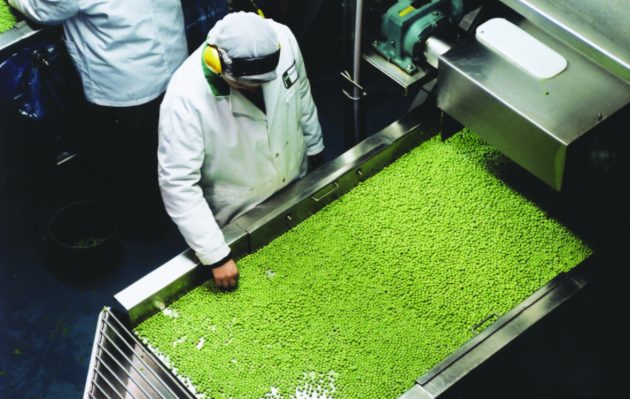
Using pulsed light to boost the safety of frozen vegetables
By Lilian Schaer for Canadian Food Innovation Network
Research & Development Fruit & Vegetables Bonduelle Americas Canadian Food Innovation Network Food innovation food safety Photo © Bonduelle Americas
Photo © Bonduelle Americas A large processor of frozen and canned vegetables in Canada is hoping to add a new tool to its roster of processes to further enhance safety of its food products.
Bonduelle Americas, one of the world’s leading processors of fruits and vegetables, is exploring how to best apply pulsed light technology during a final stage of processing as an additional step to ensure its frozen vegetables are Listeria-free. Listeria is a leading cause of foodborne illness and a priority pathogen in the processed frozen vegetable sector.
“Food safety is always important and with pathogens always present and around the corner, we need to continually be developing new tools,” explains R&D director Louis Falardeau. “Our goal is an additional hurdle for any potential pathogens before going to market. Even though the potential for contamination is already very limited at this point, this is an extra tool in addition to those we are already using.”
Pulsed light is not a new technology, but it has not previously been used for this purpose. This led Bonduelle to team up with agri-food technology innovation centre, Cintech Agroalimentaire, in Quebec on a project that is part of the Canadian Food Innovation Network (CFIN) Emerging Science Research Cluster.
The goal is to determine how well the process would work on listeria and how to best optimize and scale the technology for a food processing environment.
The pulsed light is non-penetrating, so it only kills pathogens on exposed surface. The goal of the research is to find different ways of applying the pulsed light so that it reaches all areas of the vegetables in the very short amount of time they are passing through the processing line.
Work includes experimenting with different exposure times and energy levels using various application processes to find the optimal set-up for peas, corn, green beans, and sliced carrots.
By the end of the project, Bonduelle expects to have confirmation that the technology is working and be ready to do a larger scale pilot. This includes knowing key information like what size of machine would fit into existing processing lines, how the light should be set up, and how treatment must be applied to be most effective.

Photo © AJ_Watt/Getty
“The Listeria risk is already very low at the end of processing, but only one positive test means product is rejected – so we want to avoid any potential for cross-contamination,” says Falardeau. “This technology will reduce the need for a complex sample testing protocol that could be required for some markets – it’s expensive and time-consuming and ultimately, is still just based on samples.”
Being able to access funding through cluster program has been invaluable for Bonduelle because it has put academic researchers and research institutes at their disposal and enabled what Falardeau considers essential collaboration opportunities.
“The funding through the cluster is major for us. If we don’t have this type of support, then often the amounts invested versus the level of risk doesn’t allow us to carry out projects in the frozen products sector of the industry,” notes Falardeau. “But a technology such as pulsed light allows us to add another level of safety to our products, something we are obviously looking to do for consumers and the industry in general.”
The technology is also applicable to other pathogens beyond Listeria.
Why is this innovation important?
- Extends food safety with an extra end-step to eliminate any potential residual traces of Listeria
- Strengthens human health by reducing illness
- Eases access to global food markets
What does this project mean to Canada’s food processing industry?
This technology will help ensure frozen food products are listeria-free, ensuring food is safe and providing access to global food markets.
About Bonduelle
The French family-run Bonduelle Group is one of the largest global fruit and vegetable processors with markets in over 100 countries and more than 50 processing facilities worldwide. In Canada, Bonduelle has offices in Quebec and Ontario, and processing plants in Quebec, Ontario and Alberta.
About the project team
Louis Falardeau is the R&D director at Bonduelle Americas, where he is responsible for the frozen and canned vegetables innovation and product development activities in North America. He is a graduate of Université Laval in food science and technology.
The Canadian Food Innovation Network Emerging Science Research Cluster is funded in part through the AgriScience Program under the Canadian Agricultural Partnership, a federal-provincial-territorial initiative. For more information, contact Laura Sider, science co-ordinator, CFIN.
Print this page